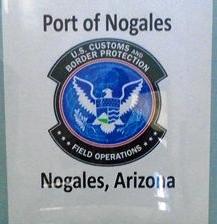PHOENIX — A U.S. citizen is suing the federal government after she said she was taken in handcuffs by border officers to a Nogales hospital for a body cavity search — which found nothing — and then billed for the procedure.
Ashley Cervantes says in her lawsuit that she had crossed into Mexico on foot in October 2014 to have breakfast at a restaurant where she often eats. On returning, she presented border officials with her birth certificate and state identification card.
Attorney Brian Marchetti said they accused the woman, 18 at the time, of possessing drugs. When she denied that was true, they took her into a detention room where, during the next several hours, she was handcuffed to a chair, had several dogs sniff her, and eventually taken into a separate room where she was patted down and asked to squat so female investigators could visually inspect her.
All that, said Marchetti, occurred without her consent or a warrant. In fact, he said, a request to call her mother was denied.
It was what happened next that Marchetti charges clearly violated his client's rights.
He said an agent of Customs and Border Protection signed a "Treatment Authorization Request'' to have her taken to a medical facility as an alleged "potential internal carrier of foreign substance.'' That form, he said, requested an X-ray.
Instead, Marchetti said Cervantes was taken in handcuffs to Carondelet Holy Cross Hospital where a doctor conducted a body cavity search.
"Ashley had never before been to a gynecologist and, for the remainder of her life, will always remember that her first pelvic and rectal exams where under the most inhumane circumstances imaginable to a U.S. citizen at a hospital on U.S. soil,'' Marchetti charges in his lawsuit.
No drugs ever were found, Marchetti said, and his client was released after about seven hours.
The attorney said the problem goes beyond the decisions by federal agents. He charged that the hospital has no protections in place to ensure that searches sought by law enforcement comply with constitutional requirements.
A spokesman for Customs and Border Protection declined to comment.
But the agency's policy says that body cavity searches must be approved by a supervisor "and after obtaining consent or a search warrant.'' It also says that consent to X-rays "must be freely and voluntarily given'' or a court order is required.
A request for comment from the hospital yielded no response.
Marchetti did not dispute that standards for searches of someone crossing into the country, even a U.S. citizen, may be different than someone stopped by police elsewhere. But he told Capitol Media Services none of that excuses what happened to Cervantes.
"Wherever the line is, it's crossed here where you have an American citizen who, by the way, the most trouble she's ever been in is an hour of detention her freshman year of high school,'' he said.
"Whether or not the border exception applies here, we would certainly submit the search needs to be reasonable,'' Marchetti said. And even if "reasonable minds'' could disagree on whether an X-ray might have been appropriate, that was not the course taken by Customs and Border Protection.
And Marchetti said if the invasion of his client's body was not enough, that was not the end. The hospital had one more thing.
"They even billed her parents for the 'treatment' for $575,'' he said.
The case will be heard in front of a federal judge in Tucson.





